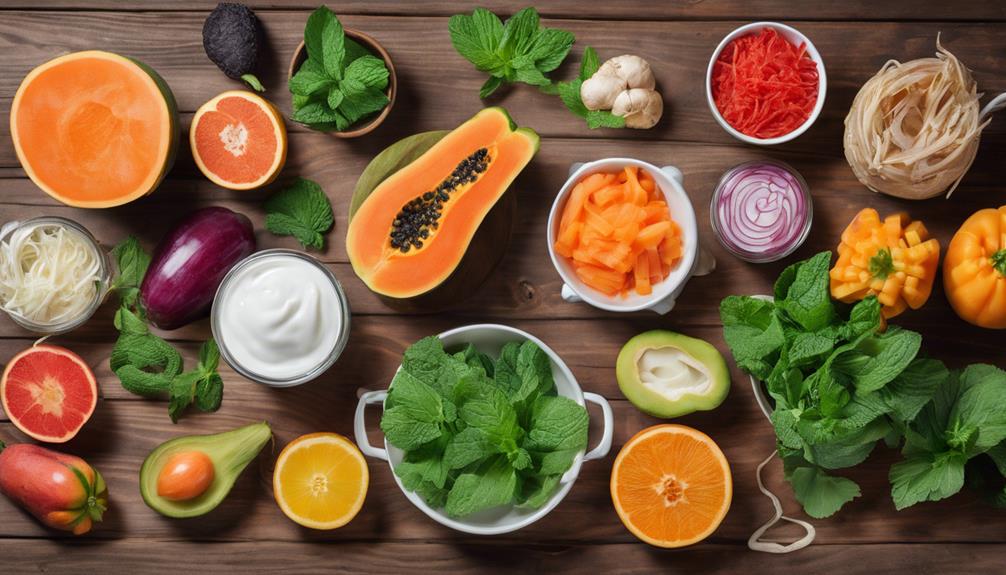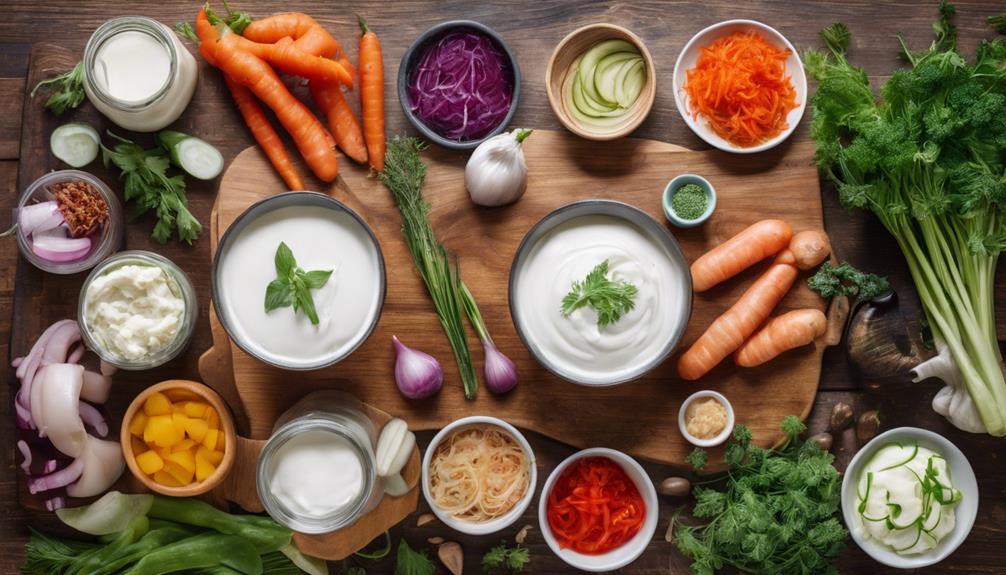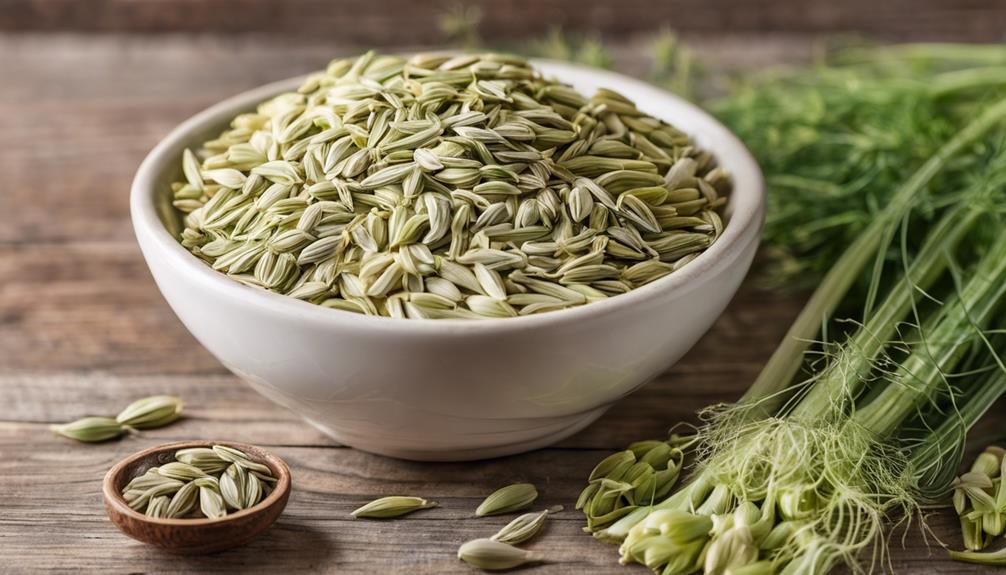Natural Remedies for Healthy Digestion
If you've been feeling bloated or experiencing digestive discomfort, exploring natural remedies could offer relief. Imagine a world where your gut feels balanced and your digestion is smooth. By incorporating simple yet effective natural remedies into your daily routine, you might be surprised at the positive impact they can have on your overall well-being. From herbal teas to probiotic-rich foods, there are numerous options to explore. So, why not take a step towards better digestive health today?
Key Takeaways
- Peppermint, ginger, and chamomile teas soothe digestive discomfort.
- Digestive enzymes aid in food breakdown for better absorption.
- Probiotic foods like yogurt support beneficial gut bacteria.
- Aloe Vera juice provides vitamins and antioxidants for digestion.
- Ginger supplements reduce bloating and digestive discomfort.
Herbal Teas
When it comes to promoting healthy digestion, incorporating herbal teas into your daily routine can be a beneficial practice. Tea blends crafted with ingredients like peppermint, ginger, or chamomile have been traditionally used to support digestive health.
Peppermint tea, for instance, is known for its ability to soothe digestive discomfort and reduce bloating.
Ginger tea, with its anti-inflammatory properties, can aid in digestion by stimulating the production of digestive enzymes.
Chamomile tea is gentle on the stomach and may help calm digestive issues like indigestion and gas.
These herbal blends not only offer comforting aromas and flavors but also provide a range of health benefits for your digestive system. By incorporating these teas into your daily routine, you can enjoy their soothing effects and potentially improve your overall digestive wellness naturally.
Digestive Enzymes
Utilizing digestive enzymes can play a crucial role in aiding your body's natural digestive processes. Enzyme supplements can be beneficial for individuals experiencing digestive health issues, as they help break down food into nutrients that the body can absorb more easily. These supplements can assist in reducing bloating, gas, and indigestion, promoting overall gut health.
In addition to enzyme supplements, incorporating enzyme-rich foods into your diet can also support optimal gut health. Foods like pineapple, papaya, kiwi, and fermented vegetables contain natural enzymes that can aid in the digestion process. Including these foods in your meals can help enhance nutrient absorption and alleviate digestive discomfort.
Probiotic Foods
To optimize your digestive health, incorporating probiotic foods into your daily diet can be highly beneficial. Probiotic foods contain live beneficial bacteria that promote gut health by supporting microbiome balance. Fermented foods like yogurt, kefir, sauerkraut, and kimchi are rich sources of these beneficial bacteria. By consuming probiotic foods regularly, you can enhance the diversity of your gut microbiota, which plays a crucial role in maintaining a healthy immune system.
The live cultures present in probiotic foods help populate your intestines with good bacteria, which can aid in digestion and nutrient absorption. These beneficial bacteria also compete with harmful pathogens, thereby promoting a balanced gut environment. A healthy gut microbiome not only supports digestion but also influences your immune system's functioning.
Incorporating probiotic foods into your daily meals is a simple and effective way to promote gut health and overall well-being. By nurturing your microbiome through the consumption of probiotic-rich foods, you can support your immune system and optimize your digestive function.
Aloe Vera Juice
Aloe Vera juice is a popular natural remedy known for its potential benefits in supporting digestive health. The gel from the Aloe Vera plant contains vitamins, minerals, and antioxidants that may help soothe and support the gastrointestinal tract. Some potential benefits of Aloe Vera juice include aiding in digestion, promoting gut health, and reducing inflammation in the stomach and intestines.
However, it's essential to be aware of potential side effects when consuming Aloe Vera juice. Some individuals may experience abdominal cramps, diarrhea, or allergic reactions. It's recommended to start with small amounts to see how your body reacts and consult with a healthcare provider if you have any concerns.
When choosing Aloe Vera juice, look for reputable brands that offer pure, organic products without added sugars or artificial ingredients. You can also explore different Aloe Vera juice recipes to incorporate this natural remedy into your daily routine. Remember to use it in moderation and listen to your body's responses to reap the potential benefits of Aloe Vera for digestive health.
Apple Cider Vinegar
For maintaining a healthy digestive system, Apple Cider Vinegar is a popular natural remedy with potential benefits. Apple Cider Vinegar contains acetic acid, which may help improve digestion by increasing stomach acid production. This can aid in the breakdown of food and enhance nutrient absorption. Some studies suggest that Apple Cider Vinegar may also help regulate blood sugar levels, which can indirectly benefit digestion.
When considering incorporating Apple Cider Vinegar into your routine, it's important to be mindful of potential risks. The high acidity of Apple Cider Vinegar can be harsh on tooth enamel and the throat if consumed undiluted. It's recommended to dilute one to two tablespoons of Apple Cider Vinegar in a large glass of water before consuming.
To enjoy the benefits of Apple Cider Vinegar without adverse effects, start with a low dosage of one tablespoon per day and gradually increase to a maximum of two tablespoons. Taking it before meals may help optimize its digestive benefits. Remember, moderation is key to reaping the advantages of this natural remedy without the risks.
Ginger Supplements
Ginger supplements are widely recognized for their potential to support digestive health. Incorporating ginger into your routine can aid in alleviating various digestive issues. Here are some ways you can benefit from ginger supplements:
- Ginger's Active Compounds: Its active compounds like gingerol and shogaol possess anti-inflammatory properties that can help reduce digestive discomfort.
- Ginger Tea: Drinking ginger tea can stimulate digestion, relieve bloating, and ease nausea after meals.
- Ginger Capsules: Taking ginger capsules before meals may help improve overall digestion and nutrient absorption.
- Anti-Nausea Effects: Ginger supplements are known for their anti-nausea effects, making them a great option for individuals prone to motion sickness or morning sickness.
Consider incorporating ginger supplements like ginger tea or ginger capsules into your daily routine to promote healthy digestion and alleviate digestive issues.
Fennel Seeds
Fennel seeds, a versatile and aromatic herb commonly used in cooking, have also been valued for their potential digestive benefits. These small seeds are known for their ability to aid digestion and alleviate bloating and gas. Fennel seed benefits include soothing the digestive tract and promoting healthy digestion. You can incorporate fennel seeds into your daily routine by chewing them whole after meals or brewing them into a soothing tea.
| Fennel Seed Benefits | Culinary Uses |
|---|---|
| Aids digestion | Adds flavor to dishes |
| Reduces bloating and gas | Used in spice blends |
| Soothes the digestive tract | Enhances salads |
| Promotes healthy digestion | Flavoring in breads |
| Infuses oils and vinegars |
While fennel seeds offer numerous benefits, it's important to be mindful of potential side effects and precautions. Some individuals may experience allergic reactions to fennel seeds, and excessive consumption can lead to side effects like nausea or allergic skin reactions. Pregnant women should consult with a healthcare provider before using fennel seeds due to their potential effects on pregnancy. Enjoy the benefits of fennel seeds in moderation to support your digestive health effectively.
Peppermint Oil
Peppermint oil, derived from the peppermint plant, is another natural remedy with potential benefits for digestive health. When used properly, it can aid in soothing various digestive issues. Here are some key points to consider:
- Peppermint Oil Benefits:
- Helps relieve indigestion and bloating.
- May reduce symptoms of irritable bowel syndrome (IBS).
- Can ease stomach cramps and discomfort.
- Supports overall digestive function.
- Peppermint Oil Side Effects:
- Excessive consumption can lead to heartburn.
- Some individuals may experience allergic reactions.
- High doses may cause mouth sores or headaches.
- Not recommended for pregnant women or young children.
Considering these benefits and potential side effects, it's essential to use peppermint oil judiciously in your digestive health routine. It can be incorporated into your diet through various recipes and uses. From adding a drop to your tea to using it in cooking, peppermint oil offers a versatile and effective option for digestive support.
Chia Seeds
Chia seeds, a nutrient-dense superfood packed with essential nutrients, are renowned for their potential benefits in promoting digestive health. These tiny seeds are rich in fiber, omega-3 fatty acids, antioxidants, and various minerals, making them a great addition to your diet. When it comes to digestive health, chia seeds can help regulate bowel movements, promote a healthy gut microbiome, and reduce inflammation in the digestive tract.
| Chia Seed Puddings | Chia Seed Smoothies |
|---|---|
| Delicious and easy to make, chia seed puddings are a great way to incorporate chia seeds into your diet. | Chia seed smoothies offer a refreshing and nutritious option for adding chia seeds to your daily routine. |
| Mix chia seeds with your favorite milk, sweetener, and flavors, then let it sit overnight for a tasty pudding. | Blend chia seeds into your smoothies for an extra boost of fiber, protein, and omega-3s. |
Include chia seed puddings and chia seed smoothies in your meal plan to enjoy the benefits of these versatile seeds for your digestive well-being.
Turmeric Powder
Rich in a compound called curcumin, Turmeric Powder has gained recognition for its potential digestive benefits. Incorporating turmeric into your daily routine can be a simple way to support your digestive health. Here are some benefits and tips for using turmeric:
- Turmeric Benefits: Curcumin, the main active ingredient in turmeric, has anti-inflammatory properties that can help reduce inflammation in the gut, easing digestion.
- Digestion: Turmeric stimulates the gallbladder to produce bile, which aids in the digestion of fats. This can help improve overall digestion and prevent bloating or discomfort.
- Incorporating Turmeric: Add a pinch of turmeric powder to your morning smoothie, sprinkle it over roasted vegetables, or include it in soups and stews for a flavorful boost.
- Daily Routine: Consider starting your day with a warm cup of turmeric tea or golden milk to kickstart your digestion and reap the benefits of this powerful spice.
Slippery Elm Bark
Slippery Elm Bark, derived from the inner bark of the slippery elm tree (Ulmus rubra), is a natural remedy known for its soothing properties on the digestive system. This bark offers various benefits for gastrointestinal health due to its healing properties.
When consumed, Slippery Elm Bark forms a gel-like substance that coats the stomach and intestines, providing a protective barrier against irritation. This protective layer can help with conditions like acid reflux, gastritis, and inflammatory bowel diseases.
The healing properties of Slippery Elm Bark extend beyond just soothing irritated tissues. Its high mucilage content can aid in relieving symptoms of constipation, diarrhea, and other digestive discomforts. Additionally, Slippery Elm Bark can help promote overall digestive health by supporting the growth of beneficial gut bacteria.
Incorporating Slippery Elm Bark into your daily routine can be as simple as brewing it into a tea or taking it in supplement form. Always consult with a healthcare provider before adding any new remedies to your regimen, especially if you're pregnant, nursing, or taking medications.
Licorice Root
Derived from the root of the Glycyrrhiza glabra plant, Licorice Root is a herbal remedy renowned for its potential benefits in promoting digestive wellness. Here's what you need to know:
- Licorice Root Benefits:
- Soothes Digestive Discomfort: Licorice root contains compounds that may help reduce inflammation in the stomach and intestines, easing symptoms like bloating and indigestion.
- Supports Healthy Gut Flora: This herb has prebiotic properties that can nourish beneficial bacteria in the gut, promoting a balanced microbiome.
- Protective Effects: Licorice root may help protect the stomach lining from damage caused by excess stomach acid, potentially aiding in the management of conditions like ulcers.
- Anti-inflammatory Properties: The anti-inflammatory nature of licorice root can help calm digestive issues related to inflammation, such as gastritis.
- Licorice Root Side Effects:
- Potential for High Blood Pressure: Excessive consumption of licorice root may lead to increased blood pressure due to its active compound glycyrrhizin.
- Hormonal Effects: Glycyrrhizin in licorice root can affect hormone levels, potentially leading to issues like low potassium levels.
- Allergic Reactions: Some individuals may be allergic to licorice root, which can manifest as skin rashes or difficulty breathing.
- Interaction with Medications: Licorice root can interact with certain medications, so consult a healthcare provider before incorporating it into your routine.
Frequently Asked Questions
Can I Combine Different Natural Remedies for Better Digestion?
You can combine herbal teas and probiotic supplements for better digestion. Herbal teas aid in soothing the digestive system, while probiotic supplements introduce beneficial bacteria. Consult a healthcare provider before starting any new regimen for personalized advice.
Are There Any Side Effects of Using These Natural Remedies?
Using natural remedies for digestion can have potential risks if not used properly. Long-term effects may vary based on individual health. Consult a healthcare provider for personalized advice on safe and effective natural remedies.
How Long Does It Take to See Results From These Remedies?
Results from natural remedies for healthy digestion can vary, but generally, you may notice improvements within a few weeks. Consistency is key. Pay attention to timeline expectations and monitor progress to gauge effectiveness and make adjustments as needed.
Can Children or Pregnant Women Use These Natural Remedies?
For safety precautions, it's essential to consult a healthcare provider before children or pregnant women use natural remedies. Alternative options like dietary changes or probiotics may be safer and more suitable for their specific health needs.
Should I Consult a Doctor Before Trying These Natural Remedies?
Before trying natural remedies, consulting a doctor is vital. Potential risks and individual needs necessitate the doctor's guidance. Ensure safety and efficacy by seeking professional advice tailored to your specific health conditions and concerns.
Conclusion
Incorporating natural remedies like herbal teas, digestive enzymes, probiotic foods, aloe vera juice, apple cider vinegar, chia seeds, turmeric powder, slippery elm bark, and licorice root can support healthy digestion. By exploring these options, you can take proactive steps towards improving your gut health and overall well-being. Remember, a balanced diet, regular exercise, and proper hydration are also key factors in maintaining optimal digestive function. Embrace these natural remedies to nurture your gut and feel your best.














